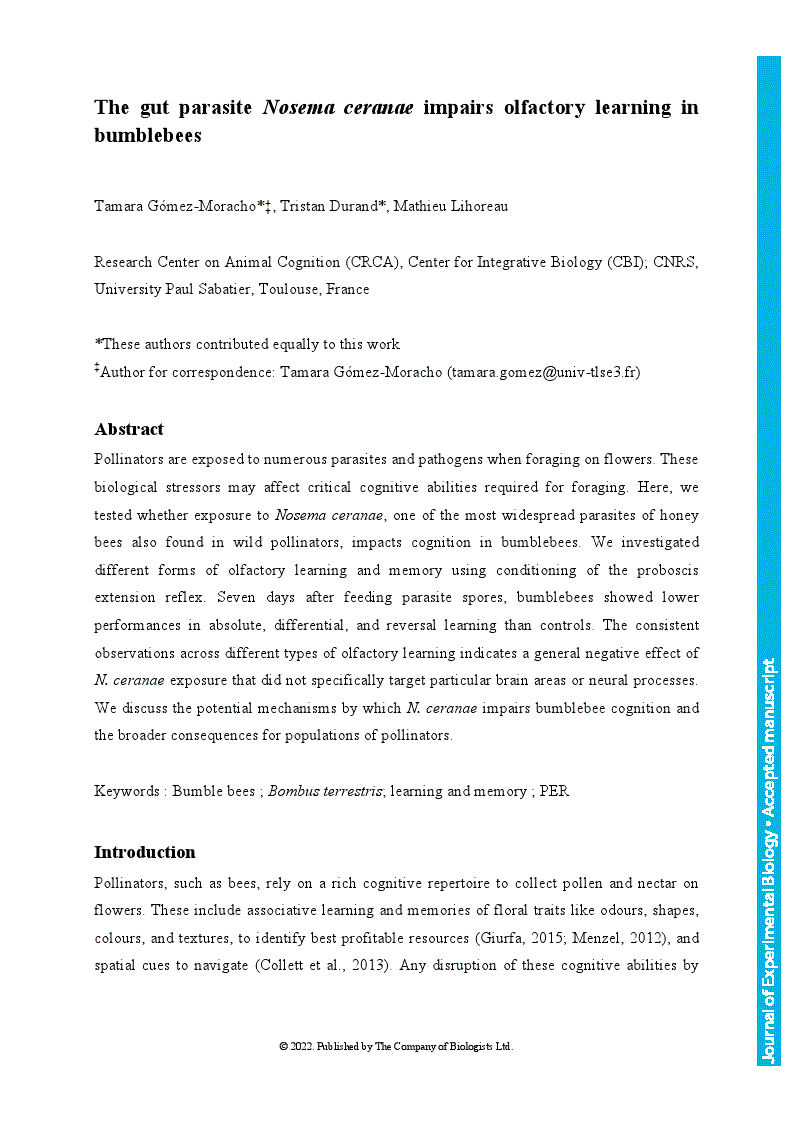Pollinators are exposed to numerous parasites and pathogens when foraging on flowers. These biological stressors may affect critical cognitive abilities required for foraging. Here, we tested whether exposure to Nosema ceranae, one of the most widespread parasites of honey bees also found in wild pollinators, impacts cognition in bumblebees. We investigated different forms of olfactory learning and memory using conditioning of the proboscis extension reflex. Seven days after feeding parasite spores, bumblebees showed lower performances in absolute, differential, and reversal learning than controls. The consistent observations across different types of olfactory learning indicates a general negative effect of N. ceranae exposure that did not specifically target particular brain areas or neural processes. We discuss the potential mechanisms by which N. ceranae impairs bumblebee cognition and the broader consequences for populations of pollinators.
The gut parasite Nosema ceranae impairs olfactory learning in bumblebees
These authors contributed equally to this work
- Award Group:
- Funder(s): Fondation Fyssen
- Funder(s):
- Award Group:
- Funder(s): Agence Nationale de la Recherche
- Award Id(s): POLLINET ANR455 16-CE02-0002-01
- Funder(s):
- Award Group:
- Funder(s): European Regional Development Fund
- Funder(s):
- Award Group:
- Funder(s): Agence de la Transition Ecologique
- Funder(s):
Currently Viewing Accepted Manuscript - Newer Version Available
Tamara Gómez-Moracho, Tristan Durand, Mathieu Lihoreau; The gut parasite Nosema ceranae impairs olfactory learning in bumblebees. J Exp Biol 2022; jeb.244340. doi: https://doi.org/10.1242/jeb.244340
Download citation file:
Advertisement
2023 JEB Outstanding Paper Prize shortlist and winner

The JEB Editors are delighted to announce the shortlisted authors for the 2023 JEB Outstanding Paper Prize. Read the winning paper - Tiny spies: mosquito antennae are sensitive sensors for eavesdropping on frog calls - by Hoover Pantoja-Sanchez and Brian Leavell from Ximena Bernal's lab at Purdue University, USA.
JEB Science Communication Workshop for ECRs

If you’re an early-career researcher interested in science communication and are attending the SEB Annual Conference in Prague this summer, come a day early and join the JEB Editors at a sci comm workshop to learn the key writing skills needed to promote your research to a broad audience beyond your peers (1 July at 14.30-17.30). Places are limited to 24 attendees, and applicants should apply through the SEB registration page by 30 April 2024.
Bridging the gap between controlled conditions and natural habitats in understanding behaviour

Novel technologies enable behavioural experiments with non-model species, in naturalistic habitats and with underexplored behaviours. In their Commentary, Scholz and colleagues discuss how to obtain a deeper understanding of the natural ecology and lifestyle of study animals.
Beluga metabolic measures could help save species

To help save animals from extinction, it’s important to understand what each species needs to survive. This led Jason John et al. to measure the metabolic rates of captive belugas to develop a ‘fish calculator’ showing that the whales need to eat ~23 salmon per day.
ECR Workshop on Positive Peer Review

Are you an ECR looking for tips on how to write concise, astute and useful manuscript reviews? If so, join the JEB Editors at a 2-hour JEB-sponsored Workshop on Positive Peer Review at the Canadian Society of Zoologists annual meeting in Moncton on 9 May 2024 at 13.00-15.00. There are 25 spaces for ECRs and selection is first come, first serve. To sign up, check the ECR Workshop box when you register for the CSZ meeting.



